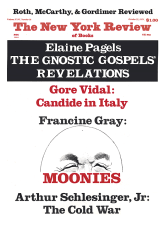In response to:
A Contest Between Conjurors from the July 19, 1979 issue
To the Editors:
In The New York Review of July 19, Harry Levin reviews the Nabokov-Wilson Letters. In this review, Harry Levin makes some false statements. What it means for the “Irving Babbitt Professor of Comparative Literature at Harvard University” to make these I leave to your next commentator on the state of education in America to speculate; what these false statements are should be pointed out and corrected now.
- “…Bunny seldom addresses Volodya as such.” “Bunny” addresses his letters to “Volodya” in fifty-nine of his extant ninety-some-odd letters, or in about two thirds. That “seldom” means “two thirds” at Harvard your commentator should ponder.
- “Wilson never read [The Gift]; nor did he read…Invitation to a Beheading;…” Edmund Wilson comments on Invitation to a Beheading on page 233 of his A Window on Russia, and he comments on The Gift on pages 235-236.
Herbert Ruhm
New York City
Harry Levin replies:
Having now pursued the subject as arithmetically as Mr. Ruhm, I must recognize that Wilson addresses Nabokov by his nickname fifty-nine times. Having gone on farther with the recount, I must add that it is quite misleading to describe the 113 Wilson letters as “ninety-some-odd.” The percentage of “Dear Volodyas” comes much closer to half than to two thirds. Admittedly, that is not “seldom.” Yet, for anyone interested in the substantive relationship, it contrasts significantly with the 137 “Dear Bunnys.” Most of the friends that Wilson made after forty called him Edmund, as did Mary Mc-Carthy and Elena Wilson. Nabokov’s familiarity was somewhat exceptional under the circumstances, and Wilson held out longer with more formal salutations.
The reader who looks up Mr. Ruhm’s page-references to The Gift and Invitation to a Beheading in A Window on Russia will find that they constitute two perfunctory allusions, which by no means presuppose the truly Wilsonian process of reading a book. I could have made an even stronger point about Wilson’s resistance and Nabokov’s frustration over that matter in their correspondence. I am willing to take responsibility for what I have written, and to make due allowance for a word-count which ends by overstating what would have been my own first-hand impression of the actualities involved. But I cannot see that this attaints an institution which happens to employ me, or authenticates the pretensions of Mr. Ruhm as a monitor of educational standards.
This Issue
October 25, 1979



